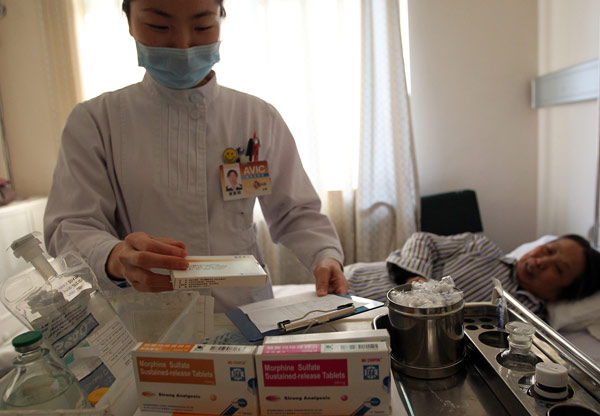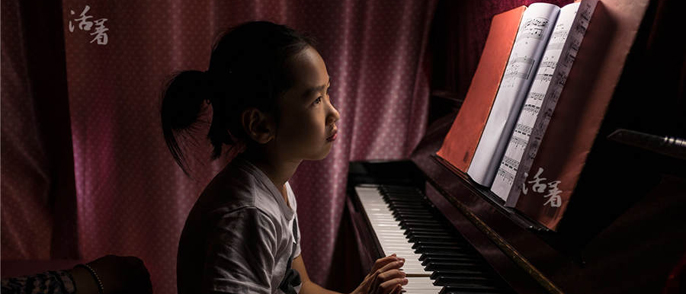Morphine is culturally a tough medicine
 |
|
A nurse selects morphine tablets for a patient at Beijing Aviation General Hospital. Many patients fear that they may become addicted to the drug. PHOTOS BY ZHANG WEI / CHINA DAILY
|
As a high-profile oncologist and pain-control expert, Liu Duanqi had never been faced with the prospect of cutting short a lecture when in full flow - or even how to react to a request to do so. That is, until he found himself in that situation when the suggestion was put forward, not so politely, by a municipal health officer at a relatively remote northern city around 12 years ago.
"My topic was the use of morphine to alleviate cancer pain. A little more than 20 minutes into the lecture, I started to get the first of a steady flow of paper slips, secretly passed to me by our local contact man who'd been effusive in his praise for the 'expert from Beijing'," recalled Liu. "On the paper was a scribbled request: 'Could you please end your speech in 15 minutes?'"
Bewildered, Liu was tempted to think that he'd been talking too long and had accidentally taken up time reserved for the next speaker, although this seemed highly unlikely. Things became clearer when the tentative suggestion turned into an urgent plea, then a thinly veiled demand and finally, a direct order as an apparently irate official strode onto the stage, snatched the microphone from his stunned guest and announced flatly, "I wouldn't have invited Professor Liu if I'd known what he was planning to talk about".
Blame morphine for the unexpected and deeply embarrassing "showdown" - at least that seemed to be the mindset of Liu's sulking host. In fact, according to Liu, former director of the oncology department at the General Army Hospital in Beijing, as one of China's principal proponents of its use, the medicine - or dangerous drug, depending as much on people's perception as on its actual use - has more than once put him at the center of conflict.
To put it simply, a medicine recommended by the World Health Organization as the most effective treatment for severe and chronic pain is still widely viewed in China as something that people should avoid at all costs, even if they are suffering miserably and have a clinically estimated life expectancy of no more than a few months.
Addiction concerns
"The key word is addiction," said Liu.
| EVOLVING THOUGHTS ABOUT MORPHINE |
|
Clinical observations show that pain itself is capable of putting up the most powerful defense against any potential addiction. In other words, patients who take morphine for pain-relief purposes are much less likely to get hooked than those who do so recreationally, for fun.” XU GUOZHU, FORMER DIRECTOR OF PEKING UNIVERSITY’S NATIONAL INSTITUTE ON DRUG DEPENDENCE For every morphine pill given to a patient, especially an outpatient, there’s a possibility — although this very rarely happens in reality — that it will find its way into the hands of someone else. When this does happen, there’s bound to be a police investigation. And it appears to me that some health officials are simply more interested in holding onto power and staying out of trouble than reducing the toll that cancer pain takes on its victims” LIU DUANQI, FORMER DIRECTOR OF THE ONCOLOGY DEPARTMENT AT THE GENERAL ARMY HOSPITAL IN BEIJING |
|
It’s not uncommon for patients to hide the morphine pills they’ve been prescribed, sometimes abetted and assisted by their equally concerned relatives. The thought of an undignified death as a drug addict tortures them.” LIU YIN, ATTENDING PHYSICIAN AND DIRECTOR OF THE ONCOLOGY DEPARTMENT OF BEIJING’S AVIATION GENERAL HOSPITAL |
"Leaf through any Chinese history book and the First Opium War of 1840 marks the beginning of the country's contemporary history, the beginning of a vast nation's seemingly incessant humiliation at the hands of foreign powers and its long, tortuous and blood-stained road to revival," said Xu, referring to a conflict triggered when British merchants dumped large quantities of opium on the Chinese coast and its subsequent confiscation by concerned Chinese officials.
The war ended in a crushing defeat for the Qing court, whose drug-emaciated subjects were scoffed at by the victors as "the sick men of the East".
By all evidence, that vicious plume of smoke has long dissipated, but the specter remains. And morphine, as a close relative of opium - both are derived directly from the resin of the opium poppy, with the former being "purer and stronger", according to Xu - has endured its "fair" share of suspicion, dread, and plain disgust.
Except that it's all "pure misperception", said Xu, who has personally monitored the clinical tests of nearly 50 types of morphine-based drugs in China, both imported and locally manufactured.
"Clinical observations show that pain itself is capable of putting up the most powerful defense against any potential addiction," he said. "In other words, patients who take morphine for pain relief are much less likely to get hooked than those who do so recreationally, for fun."
One example is the US involvement in the Vietnam War between 1961 and 1973, during which morphine was given extensively to wounded US soldiers. Signs of addiction were later found not in those for whom the medicine was intended, but in their fellow soldiers who had managed to procure the drug with the objective of getting "high".
"Staying away from pain with morphine's help does not mean letting yourself come dangerously close to the claws of addition," said Xu. "The WHO has whittled down the addiction rate for patients using morphine to less than 0.06 percent - the number speaks for itself about the absurdity of rejecting the medicine."
The severity of the issue first rang alarm bells for Chinese policy makers in the early 1990s, as the country began to adopt the WHO's Three-Step Analgesic Ladder in Cancer Pain Relief, a document published in 1986 with the aim of legitimizing and thereby increasing the prescription of morphine, especially among cancer patients in the globe's less developed regions.
It's a battle both Liu and Xu have joined, as they led the charge and pushed the frontiers forward, slowly but consistently, for two decades. Ground has been taken and victories claimed. In 2011 - the latest figures available - the total medical consumption of morphine in China reached 1,100 kilograms. That's roughly 0.79 mg per person, more than six times higher than the number for 1999, and nearly 400 times that of 1980, when per capita morphine consumption in China was a mere 0.002mg.
One milestone breakthrough came in 1998, when the Health Ministry scraped the upper limit capping the total amount of morphine a cancer patient is entitled to during the entire process of treatment. Another followed two years later, when all Chinese hospitals were granted unlimited access to morphine, based on need instead of the number of beds in their wards, as was previously stipulated.
- China issues first white paper on traditional Chinese medicine
- China's Alipay takes root in Lapland, near the Arctic Circle
- Snow sculpture 'Love Song' to be displayed in NE China
- Xi urges more reforms to give people greater sense of gain
- Shanghai urges Apple to handle recent iPhone combustion incidents























